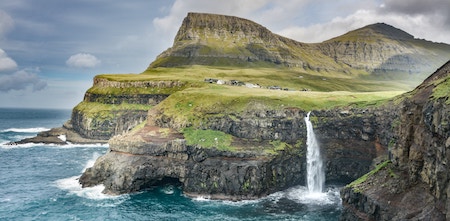First published in the NASGP Newsletter in June 2018

What can public health in UK learn from the Faroese tradition of whaling about changing cultural traditions?
The Islands and the Whales is a documentary by lawyer-turned-filmmaker Mike Day. It isn’t simply about whaling in the Faroe Islands. It’s an exploration of the practical and emotional obstacles which make it so difficult to change people’s customs, and how a doctor has worked to overcome them.
On bleak, treeless and sparsely populated islands life exists on the margin. Pilot whale meat has kept the Faroese alive for centuries. The grind – grindadráp, the whale hunt – doesn’t just secure the community’s food, it is a shared act which cements social cohesion.
But the Faroese way of life is under threat.
Faroese whaling is sustainable, but the sea in the coves where the whales are corralled and slaughtered runs red with blood. And red blood is a red rag to the militant animal rights groups who are determined that the Faroese should abandon their livelihood. When screen goddess Pamela Anderson emerges from the sea like Aphrodite, leading a group of wet-suited Californian eco-warriors in a full-frontal attack on whaling, the Faroese listen politely. They are well aware how whaling is viewed by environmentalists. But they aren’t going to be harangued by people who haven’t done their homework. “You should become vegetarian”, say the eco-warriors, who drive to Walmart for their greens. Vegetables won’t grow in the thin Faroese soil, and imports are prohibitively expensive as well as environmentally costly.
Tradition is changing, but through science, not scolding. Pilot whales are at the top of the marine food chain. In 1977 it was recognised that mercury accumulates in whale flesh, and in the flesh of people who eat whale meat. Dr Pál Weihe, head of public health in the Faroes, and Faroese himself, started a research programme to evaluate the risks. He persuaded his fellow islanders to donate hair, blood and umbilical cord blood samples, to keep dietary diaries and to allow their children’s physical and mental development to be monitored. The tests have revealed that most Faroese have a worrying level of mercury in their bodies, the dietary diaries show that the more whale products they eat the higher it is. The developmental studies correlate deficits in children’s attention, memory and various cerebral functions with dietary pre- and post-natal mercury exposure.
Dr Weihe’s research has led him to issue ever more restrictive advice about the consumption of whale products. The hospital long ago stopped serving whale. At first, the Faroese were advised not to eat whale liver or kidney, which accumulate 100 times more mercury than the flesh. Then to eat meat and blubber only once a week. Then, only twice a month, or not at all if pregnant or planning a pregnancy.
The Faroese managed to live with the natural giant; now they are paying the price of industrialisation generated thousands of miles away and from which they get little benefit.
Only a Faroese could have tackled this sensitive issue, says Dr Weihe, but even he has suffered some abuse from some local people. Can you be truly Faroese if you don’t take part in the grind, eat whale meat, savour the blubber? And the damage the mercury does isn’t immediately obvious, so the advice on their diet, like advice on smoking, drinking and exercising, is easy to reject.
A young man with a high level of mercury can’t accept that he should stop eating whale products. His wife, a nurse who has assisted Dr Weihe with the studies, sits with her two little girls on her knee and struggles with cognitive dissonance. But it is she who eventually decides that for the children’s future the family should change their diet. He husband is unwilling, but her anxieties persuade him at least to say that he will eat whale less often.
As another Faroese man said, “In the past, nature was a giant, and humans were so small. Now it’s the other way around”. The Faroese managed to live with the natural giant; now they are paying the price of industrialisation generated thousands of miles away and from which they get little benefit. The glue which binds them together is being dissolved by forces outside their control.
The days of the Huldufólk, the traditional guardians of the Faroes, are gone. Like many traditions which until a few years ago underpinned life in Britain. No magical thinking can bring back the past. Moving from pre-contemplation – denial – to contemplation and then to action can be a slow and halting process. People need time and space to change their thinking. If you’re being asked to give up something important, you need acceptable alternatives. Opinion leaders are crucial for a public health campaign to be successful. In the Faroes, the mothers have led the change. It’s taken 20 years, but the message about the dangers has got through to pregnant women who now have much lower levels of mercury.
The Islands and the Whales is not polemical. It shows how real people struggle with the difficulties of living in their remote, beautiful but challenging islands. The solutions to problems are rarely black-and-white and there is a complex web of issues and viewpoints.
GPs in Britain have to navigate through choppy seas of emotion, helping patients towards a compromise between what science tells us and what their beliefs and experience tell them. Denial is hard to overcome, and we bring to dialogues with patients the baggage from our past consultations. Watching this film, perhaps with students or colleagues, a visit to the Faroes could inspire us to review our own customs.